HECHT, 1991
AMNH 24450: Skull and nearly complete skeleton lacking distal caudals.
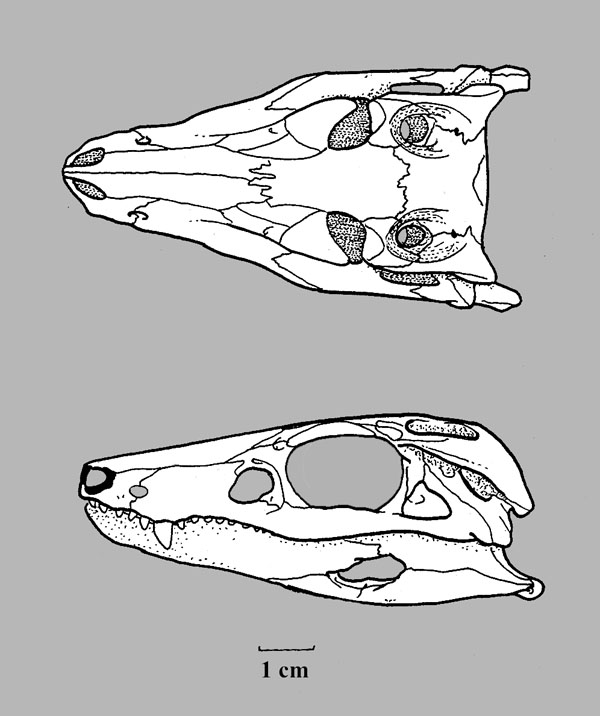
Species: gomesii PRICE, 1959
Etymology:
Holotype: DGM-DNPM 423-R
Locality: Chapade do Araripe, Ceara State, Northeastern Brazil.
Horizon: Romualdo Member, Santana Formation, Araripe Group.
Biostratigraphy:
Age: Late Aptian or Early Albian Stage, Middle Gallic Subepoch, Upper Early Cretaceous Epoch, Early Cretaceous.
Material: Skull and lower jaw.
Referred material:
HECHT, 1991
AMNH 24450: Skull and nearly complete skeleton lacking distal caudals.
_____________________________________________________________________________________
Species: wegeneri BUFFETAUT,
& TAQUET, 1979
Etymology:
= Genus: Nova? ORTEGA, GASPARINI, BUSCALIONI & CALVO, 2000
Holotype: MNHN Nr GDF 700
Locality: Gadoufaoua, Niger, Africa.
Horizon: Elrhaz Formation, Tegama Group (series).
Biostratigraphy:
Age: Aptian-Albian Stage, Middle Gallic Subepoch, Upper Early Cretaceous Epoch, Early Cretaceous.
Material: Skull and dentary missing the posterior end.
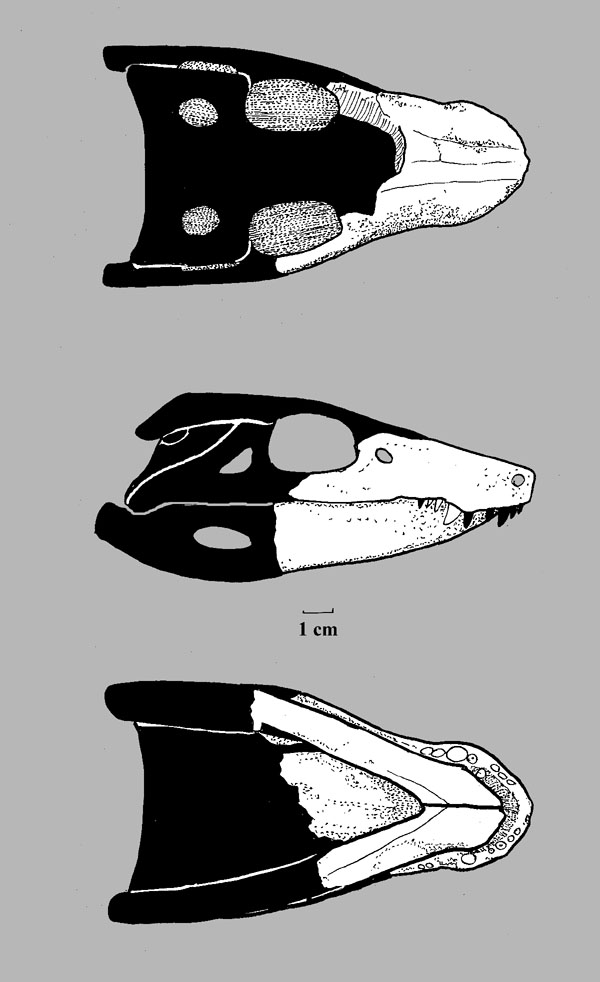
Referred material:
SERENO & LARSSON, 2009
MNN GAD19: Nearly complete cranium lacking only the portions of the lacrimal and prefrontal, the palpebrals, and some teeth.
MNN GAD20: Partial skeleton on block preserving the left side of the skull exposing the dentition in medial view and an articulated tail with dermal armor.
MNN GAD21: Partial skeleton on block preserving the ventral portion of the skull, an articulated partial forelimb, and an articulated tail with dermal armor.
MNN GAD22: Partial skeleton on block preserving the ventral portion of the skull, an articulated right manus and pes, a right calcaneum, and an articulated tail with dermal armor.
MNN GAD23: Isolated snout on block complsed of articulated upper and lower jaws preserved to mid-orbit on the right side.
MNN GAD24: Isolated left maxilla on block preserving the dentition.
MNN GAD25: Partial skeleton preserving the posterior ends of the lower jaws and most of the postcranial skeleton except the tail.
MNN GAD26: Edentulous right dentary from a juvenile.
_____________________________________________________________________________________
Species: patagonicus ORTEGA, GASPARINI,
BUSCALIONI & CALVO, 2000
Etymology: In reference to Patagonia, Argentina, where the specimen was found.
= Species: Nova GASPARINI, BUSCALIONI, ORTEGA & CALVO, 1999
Holotype: MUCPV 269
Locality: 5 km southeast of El Chocon, Neuquen Province, Argentina.
Horizon: Candeleros Member, Rio Limay Formation, Neuquen Group.
Biostratigraphy:
Age: Limayan Tetrapoda Assemblage, Cenomanian Stage, Uppermiddle Gallic Subepoch, Lowermost Gulf Epoch, Late Early or Middle Cretaceous-Turonian Stage, Uppermost Gallic Subepoch, Lower Gulf Epoch, Early Late Cretaceous.
Material: Anterior half of an articulated individual with skull and mandibles missing the most anterior portion of the rostrum. The specimen exposes the precaudal dorsal armor, and bones of both shoulder girdles (Scapulae) and fore limbs (humeri, radius and ulnae).
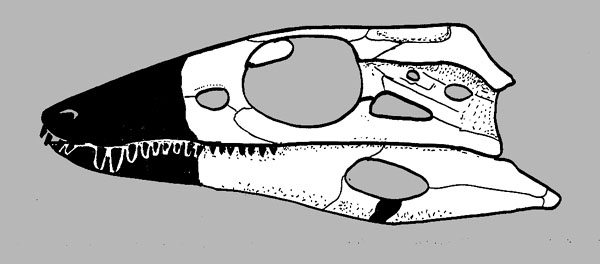
Referred material:
MUCPV 267: Anterior half of an articulated individual preserving an almost complete skull and attached mandibles.
MUCPV 268: Postcranial articulated elements.
MUCPV 268b: Distal portion of a tibia and fibula.
MUCPV 270: Distal portion of a left femur in articulation with the tibia and fibula.
MUCPV 283: An isolated anterior portion of a rostrum comprising the premaxillae and anterior tip of the maxillae, nasals and dentaries.
_____________________________________________________________________________________
Species: buitreraensis POL & APESTEGUIA, 2005
Etymology: In reference to "La Buitrera", Rio Negro Province,
NW Patagonia, Argentina; the locality where the
specimen
was found.
Holotype: MPCA-PV 235
Locality: "La Buitrera", 30 km NE from Cerro Policia, Rio Negro Province, NW Patagonia, Argentina.
Horizon: Canderlos Formation, Neuquen Group.
Biostratigraphy:
Age: Limayan Tetrapoda Assemblage, Cenomanian Stage, Uppermiddle Gallic Subepoch, Lowermost Gulf Epoch, Late Early or Middle Cretaceous-Turonian Stage, Uppermost Gallic Subepoch, Lower Gulf Epoch, Early Late Cretaceous.
Material: Isolated skull in articulation with the lower jaws, lacking external surfaces of venteral region of the braincase.
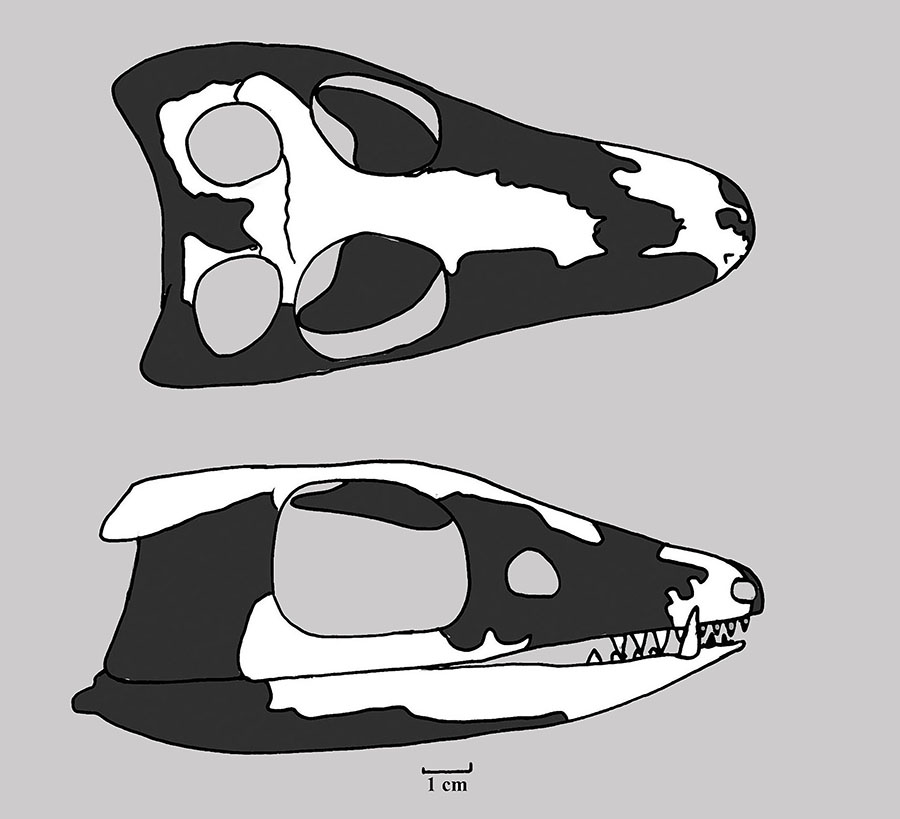
Araripesuchus buitrenaensis (modified from Pol & Apesteguia, 2005).
Referred material:
DUMONT, BONA, POL & APESTEGUIA, 2020
MPCA PV 242, 243, 513, 515, 583, 610, 614: Fragmentary skulls.
_____________________________________________________________________________________
Species: tsangatsangana TURNER,
2006
Etymology: Tsangatsangana, Malagasy expression meaing 'just out for a walk",
also used ironically for a long voage. Usage here refers to this taxon's distant
geograhpic location relative to other known Araripesuchus species.
= Araripesuchus nova
BUCKLEY, BROCHU & KRAUSE,
1997
Holotype: UA 8720
Locality: MAD93-33, Berivotra field study area, Mahanjanga Province, Madagascar.
Horizon: Anembalemba Member, Maevarano Formation.
Biostratigraphy:
Age: Maastrichtian Stage, Senonian Subepoch, Upper Gulf Epoch, Late Cretaceous.
Material: Nearly complete skull lacking posterior portion beyond the supratemporal fenestra.
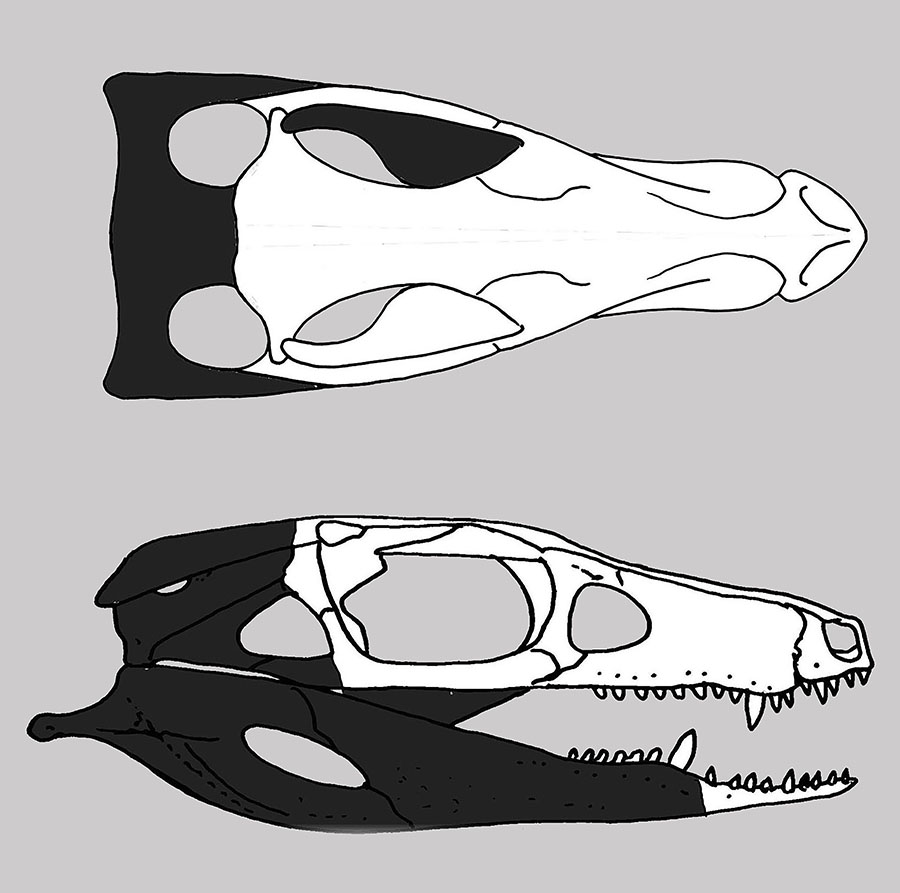
Araripesuchus tsangatsangana (modified from Turner, 2006).

Araripesuchus tsangatsangana (after Krause et al. 2019).
Paratypes:
FMNH PR 2297: A large nearly complete skull, including left and right hyoid, the first twelve presacral vertebrae with ribs, partial left and right scapulae, proximal end of right humerus, left ilium and proximal head of left femur, right femur lacking head, partial pubis and three damaged dorsal ribs, three damaged dorsal ribs, right coracoid, portion of the shaft of the right humerus, left calcaneum and astragalus.
FMNH PR 2298: Partial skull, damaged right mandible, right jugal, left radius and ulna, partial obscured right radius, nearly complete vertebral column, sacrum, portions of left and right hindlimbs.
FMNH PR 2299: Partial skull, left palpebral, left surangular and angular, right ilium, right dentary, right splenial, right angular, partial maxilla, dorsal and caudal vertebrae and dorsal ribs.
UA 8750, 8751, 8763, FMNH PR 2318: Dentaries.
FMNH PR 2316: Splenial.
UA 8754: Angular.
FMNH PR 2334: Premaxillae.
UA 8756, 8760, 8761, 8762, FMNH PR 2321: Maxillae.
UA 8752, FMNH PR 2317, 2332: Jugals.
UA 8764: Nasal.
UA 8765, FMNN PR 2322: Frontals.
FMNH PR 2315: Postorbital.
UA 8757, FMNH PR 2336: Palpebrals.
UA 8728, 8739, FMNH PR 2307, 2323: Cervicals.
UA 8722, 8723-8727, 8742, 8769-8774, FMNH PR 2304-2306: Dorsals.
UA 8767, FMNH 2301, 2330: Sacrals.
UA 872908731, 8735, FMNH PR 2308, 2309, 2330: Caudals.
UA 8732, 8733, 8755, FMNH PR 2334: Dorsal ribs.
UA 8755: Chevrons.
FMNH PR 2333: Osteoderms.
UA 8779, FMN PR 2313, 2334: Scapulae.
UA 8721, FMNH PR 2302, 2325-2327, 2340: Humeri.
FMNH PR 2324, 2331, 2327, 2329, 2339: Radii.
UA 8758, FMNH PR 2324, 2326, 2327, 2339: Ulnae.
FMNH PR 2324: Pistiform.
UA 8736, 8737, FMNH PR 2310, 2324, 2339: Radialia.
UA 8736, 8759, FMNH PR 2324, 2339: Ulnaria.
FMNH PR 2312, 2328: Manual phalanges.
FMNH PR 2328: Manual unguals.
FMNH PR 2301, 2303, 2330, UA 8768: Ilia.
FMNH PR 2330: Ischium.
UA 8776, 8777, 8778, FMNH PR 2330, 2331: Pubes.
UA 8734, FMNH PR 2300, 2330, 2337: Femora.
FMNH PR 2300, 2330, 2335, 2337: Tibiae.
UA 8781, FMNH PR 2300, 2330, 2335: Fibulae.
FMNH PR 2330: Astragalus.
UA 8736, 8780, FMNH PR 2319, 2330, 2337, 2338: Metatarsals.
UA 8743, 9744-8746, FMNH PR 2311, 2319, 2330, 2337: Pedal phalanges.
UA 8736, FMNH PR 2330: Pedal unguals.
UA 8747-8749, FMNHH PR 2314: Unidentified phalanges.
UA 8747-8749, FMNH PR 2214: Unidentifed unugals.
_____________________________________________________________________________________
Species: rattoides SERENO & LARSSON, 2009
Etymology: Latin,
rattus, Latin, -oides, 'likeness'; in reference to the enlarged, procumbent
first dentary tooth, which is reminiscent of the condition in many
rodents.
Holotpe: CMN 41893
Locality: Unknown, Er Rachidia District, Eastern Morocco.
Horizon: Kem Kem Beds.
Biostratigraphy:
Age: Cenomanian Stage, Upper Gallic Subepoch, Lowermost Gulf Epoch, Middle Cretaceous.
Material: Rigth dentary preserving alveoli 1-14.
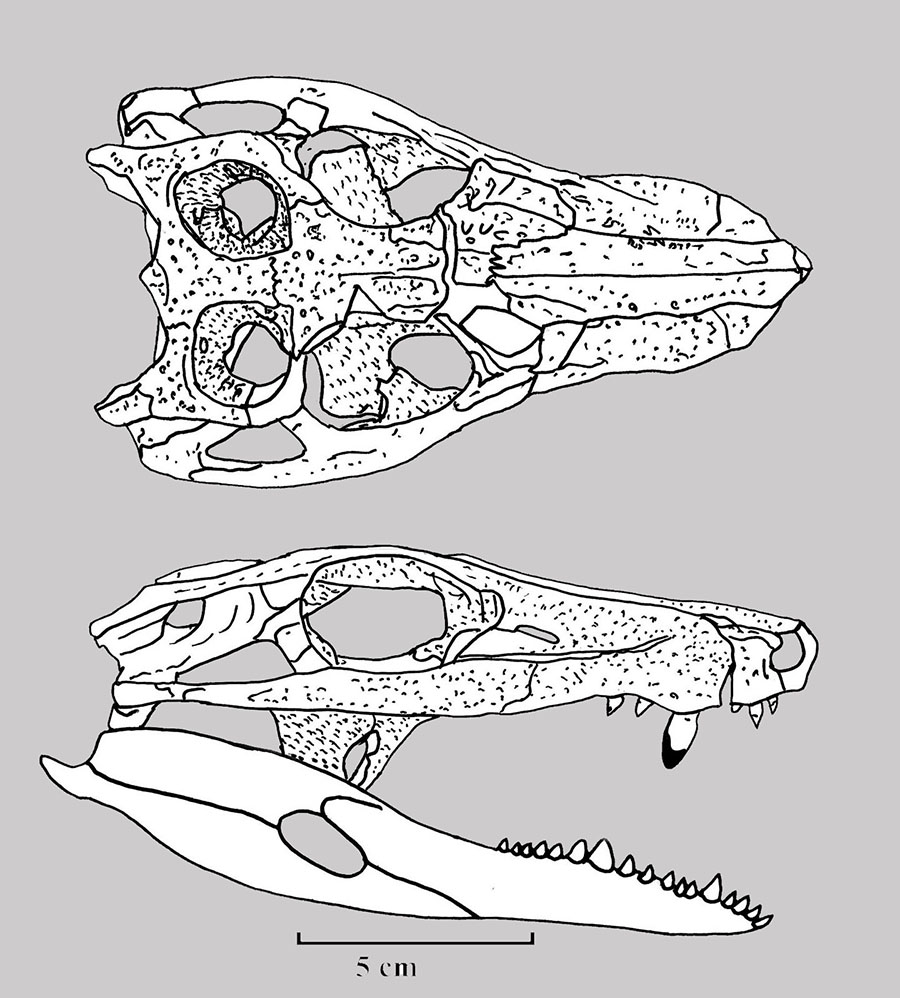
Araripesuchus rattoides (modified from Sereno & Larsson, 2009).
Referred material:
Locality: Small wash at Darelkairb, south of Erfoud, Morocco.
Horizon: Kem Kem Beds.
Biostratigraphy:
Age: Cenomanian Stage, Upper Gallic Subepoch, Lowermost Gulf Epoch, Middle Cretaceous.
Material:
UCRC PV3: Anterior portion of left dentry preserving alveoli 1-8.